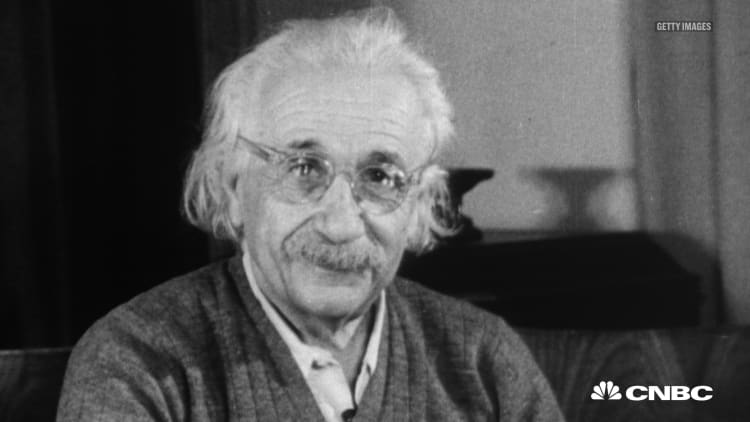If you want to be happier and more successful in life, it's important to fight the brain's natural tendency to focus on the negative. Instead, try looking at the world through a positive, self-compassionate mindset, says Emma Seppälä, Stanford psychologist and faculty director of the women's leadership program at the Yale School of Management.
Albert Einstein and Alibaba's Jack Ma are prime examples of using this mindset in order to lead successful careers, Seppälä noted in her book, "The Happiness Track."
Seppälä tells CNBC Make It that most people exhibit a psychological tendency called "negativity bias."
"As far as our minds are concerned, bad is stronger than good," she writes. To counter this, Seppälä recommends we learn how the brain works.
"It is 'plastic', which means it learns and grows from experience. You can become good at statistics, you can become comfortable as a public speaker and you can learn to be an inspiring leader of others," Seppälä says.
When it comes to our shortcomings at work, she puts it this way: If you receive 10 compliments and one critique during your performance review, "guess what you will be focusing on when you leave the room?" The negative, she writes.

Highlighting the work of social psychologist Roy Baumeister, Seppälä points out that our brain's "tendency to give more weight to the negative may have helped our species survive by highlighting potential dangers."
"However, in this day and age, our negativity bias, both as it relates to the environment and to our self-judgments, is harmful," she writes.
"When you reach your goal, you'll find that you're still not satisfied. Why? Because in addition to focusing on the negative, we also get used to the good things in our lives," she writes.
To shift to a more positive mindset and help you be more productive, Seppälä recommends replacing your belief in strengths with belief in your efforts and replacing self-criticism with self-compassion.
She further notes that neuroscientific data demonstrates that our brains continue to grow new neural pathways throughout life.
"The brain is designed for development and to learn new things," Seppälä writes. "While particular skills may come more easily, we are wired to engage, thrive and grow in any number of areas."
As the science director of Stanford's Center For Compassion and Altruism Research and Education, Seppälä says she knows "self-compassion" can sound "soft" or "idealistic." However, she explains, "it allows you to be successful without sabotaging yourself."
To replace your self-criticism with self-compassion, Seppälä recommends three steps based off of University of Texas professor Kristin Neff's research: Be kind to yourself, understand that you are part of humanity and that everyone makes mistakes, and be mindful of your thoughts and feelings.
She uses Einstein and Ma as examples of a winning mindset.
When they each faced adversity and difficult situations, they did not allow themselves to feel defeated. Instead, they persisted and believed their efforts would pay off — a mindset encapsulated in this quote Seppälä credits to Einstein: "Failure is success in progress."
Seppälä says it was good that Einstein subscribed to this belief because when he was a child, he was "so slow in learning to speak and write that his family thought he might be mentally handicapped." He would later get expelled from school, failed to gain admittance to Zurich Polytechnic School and was the only one in his class who didn't land a teaching job at the end of university.
"Had Einstein believed in the strengths theory, he would have assumed that he did not have what it took to be a scientist," Seppälä says. "However, because he believed that his skills could develop, he did not let the failures stop him but went on to revolutionize physics, eventually winning a Nobel Prize."

While many people focus on their negative qualities or weaknesses and let that hold them back, Seppälä says, Einstein did not.
"He didn't give up in the face of failure, he knew that he could just keep trying. He knew it was a question of time and effort, not that he was somehow a hopeless failure," Seppälä says. "We know from brain science that our brains can learn and evolve and change, even if you're not a 'numbers person' now, you can be tomorrow."
Meanwhile, Alibaba founder and CEO Jack Ma was born to a poor family in China and later failed his university entrance exams twice before getting accepted to Hangzhou Teachers' Institute. Upon graduation, Ma applied for dozens of jobs and faced rejection after rejection.
He eventually became an English teacher earning $12 a month and got to travel to the U.S. as part of the job. It was there where he discovered the internet, founded two internet startups that failed, and through persistence, founded Alibaba Shareholdings.
"As Ma's story shows, your self-perspective has the power to determine your overall well-being, confidence and success," Seppälä writes. "It foretells whether you will bounce back and thrive in the face of inevitable failure."
Shifting away from this downcast mental tendency will ultimately lead you to being happier, she says.
"Research shows that three times more positive than negative things happen to us, yet we focus on the negative," Seppälä says. "By realizing the good things, we will obviously be not just happier, but more realistic. We won't let our life go by wasted on complaints, we'll actually enjoy and make the best of what we have."
Like this story? Like CNBC Make It on Facebook.
Don't miss:
Warren Buffett says this one investment 'supersedes all others'
The life-changing lesson Tony Robbins says he learned from working as a janitor

This story has been updated.


